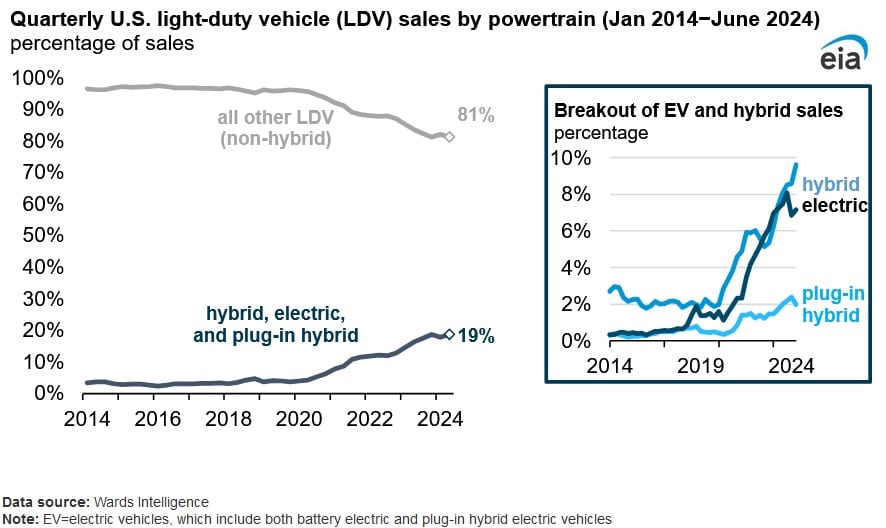U.S. Electric and Hybrid Vehicle Sales Rose in Q2 2024: EIA

U.S. sales of hybrid, plug-in hybrid, and battery electric vehicles rose from 17.8 percent of total new light duty vehicles sales in the first quarter of this year to 18.7 percent in the second quarter, according to a Aug. 26 report published by the U.S. Energy Information Administration. The increase in electric vehicle sales can be attributed to a number of factors, which include enhanced battery capacity, cost savings due to lower electric vehicle prices, and environmental concerns.
The marginal increase in electric and hybrid vehicle market share can be attributed to higher hybrid vehicle sales, which rose by 30.7 percent year-on-year. Battery electric vehicle sales accounted for 7.1 percent of the U.S. light duty vehicle market during Q2 2024. Luxury electric vehicle sales continue to remain robust and consisted of 32.8 percent of total luxury sales during Q2 2024.
The average transaction price of U.S. battery electric vehicles, not taking into account government incentives, declined from $57,405 in January 2024 to $56,371 in June 2024. In terms of company share, Tesla remains the leading manufacturer in the electric vehicle market, however it no longer remains the majority share of electric vehicle sales. Tesla’s market share was 48.9 percent of the total electric vehicle market during Q2 2024. The sales have switched to legacy manufacturers such as Hyundai, Ford, Kia and Chevrolet.
Battery electric vehicle manufacturers are producing vehicles domestically and globally. During Q2 2024 74.4 percent of electric vehicles sold in the U.S. were manufactured in North America, compared with 78.7 percent in Q2 2023. The total share of electric vehicles sold in the U.S. and manufactured in South Korea rose year-on-year from 8 percent in Q2 2023 to 12.2 percent in Q2 2024, while the share of Japanese manufactured electric vehicles rose from 2.4 percent to 7.2 percent during a similar period.
The 2021 Infrastructure and Investment Jobs Act provides $7.5 billion to develop a nationwide charging network. In addition, the law also encompassed funding to advance the U.S. electricity grid and enhance domestic battery manufacturing and recycling capacity. From a consumer perspective, the Inflation Reduction Act incentivized the purchase of electric vehicles by extending tax credits for the purchase of new vehicles and allowing tax credits for used electric vehicles.
EnerKnol Pulses like this one are powered by the EnerKnol Platform—the first comprehensive database for real-time energy policy tracking. Sign up for a free trial below for access to key regulatory data and deep industry insights across the energy spectrum.
ACCESS FREE TRIAL